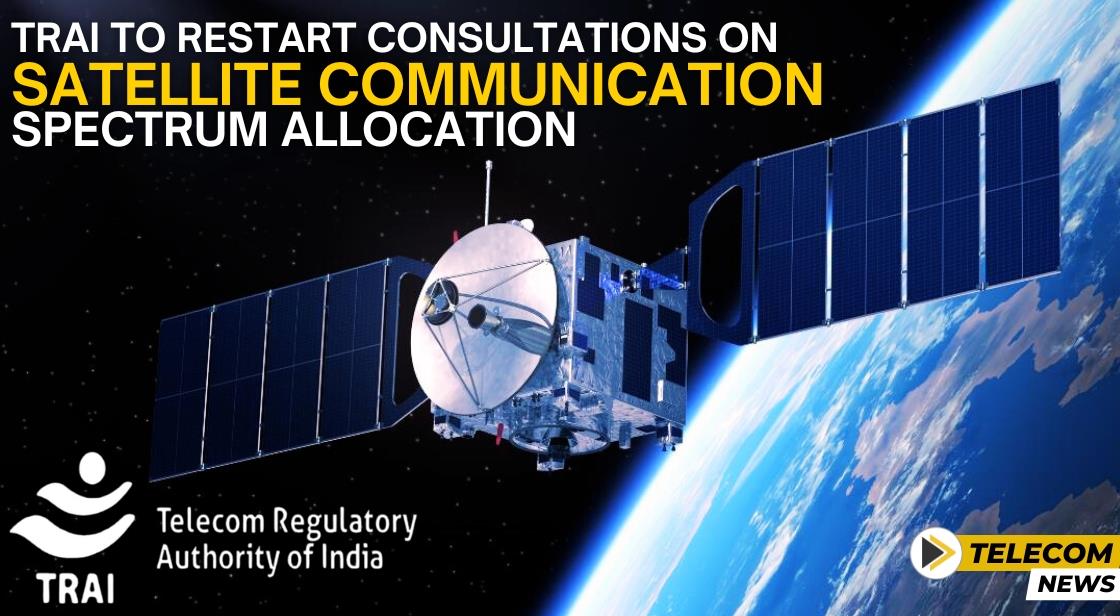Trai to Restart Consultations on Satellite Communication Spectrum Allocation

News Synopsis
The Department of Telecommunications (DoT) is preparing to send a fresh reference to the Telecom Regulatory Authority of India (Trai) within a few weeks, initiating a new round of consultations on allocating spectrum for satellite-based broadband communication services. This move comes after the previous consultation process was deemed irrelevant due to the enactment of the new telecom law.
"The terms of reference are being finalized," said a senior DoT official, requesting anonymity. "The new reference will be sent in a few weeks, and Trai will follow its fair and transparent consultation process. This will include recommendations on allocation mechanisms, frequencies, pricing, and other relevant factors."
Fresh Round of Consultations on Satellite Spectrum Allocation
New Law Paves the Way for Non-Auction Allocation
The previous consultation process, initiated in 2022, was rendered null and void due to the new Telecommunications Act 2023. This act allows the government to allocate spectrum for satellite-based communication services without going through auctions. Telecom Regulatory Authority of India (Trai) had previously sought industry feedback on whether auctions should be the primary mechanism for such allocation.
"Trai received the previous reference back in light of the new law, and discussions with the industry have already taken place," the official added.
Addressing Level Playing Field Concerns
The fresh consultations will also address concerns regarding a level playing field for all industry participants. Previously, a rift emerged between companies offering satellite-based communication services and those providing terrestrial services (telcos).
"Several parties, including L&T, Tata Group, Nasscom, Bharti Group, Starlink, and Amazon, have advocated for the non-auction route," the official explained. "However, others like Reliance and Vodafone Idea have opposed direct allocation."
Currently, Bharti Group-backed Eutelsat OneWeb and Reliance's Jio Satellite Communications are the only players with licenses for Global Mobile Personal Communication by Satellite (GMPCS) services. Notably, OneWeb is the sole company to receive approval from the space regulator IN-Space. Obtaining spectrum is crucial for these companies to launch their services in India.
Other major players like Elon Musk's Starlink and Amazon's Project Kuiper are also vying for GMPCS licenses. The fresh consultations could potentially lead to changes in licensing conditions, according to informed sources.
New Law Allows for Administrative Allocation
The new telecom law empowers the government to allocate spectrum for various services, including satellite broadband, through an administrative process. However, auctions remain the primary mode of allocation for most categories, particularly those related to terrestrial telecom services.
The Department of Telecommunications (DoT) recently clarified its stance before the Supreme Court regarding spectrum allocation outside of auctions. This move aimed to avoid conflicting with the court's 2012 judgment on the matter.
"The application filed with the Supreme Court is essentially a miscellaneous application seeking clarification on specific points," the official stated. "This was filed due process before presenting the Telecom Bill in Parliament. It doesn't request any changes to the existing Supreme Court judgment."
The government requested an urgent hearing from the Supreme Court to address the issue. The 2012 judgment mandated competitive auctions for allocating natural resources owned by the public. This was followed by a Presidential reference from the Union government seeking further clarity.
The new telecom law clearly outlines a limited set of situations where administrative allocation is permitted. These include spectrum allocation for walkie-talkies used by police organizations, weather forecasting radars, communication systems for ships and space applications, and communication networks for the military and public sector undertakings (PSUs) like BSNL. These exceptions constitute a small fraction of the total spectrum allocations.
The restart of consultations on satellite spectrum allocation signifies India's commitment to fostering innovation and competition in the satellite-based broadband market. The new regulatory framework under the Telecommunications Act 2023 is expected to expedite the rollout of these services, potentially leading to wider internet access and improved connectivity across the country.
You May Like









